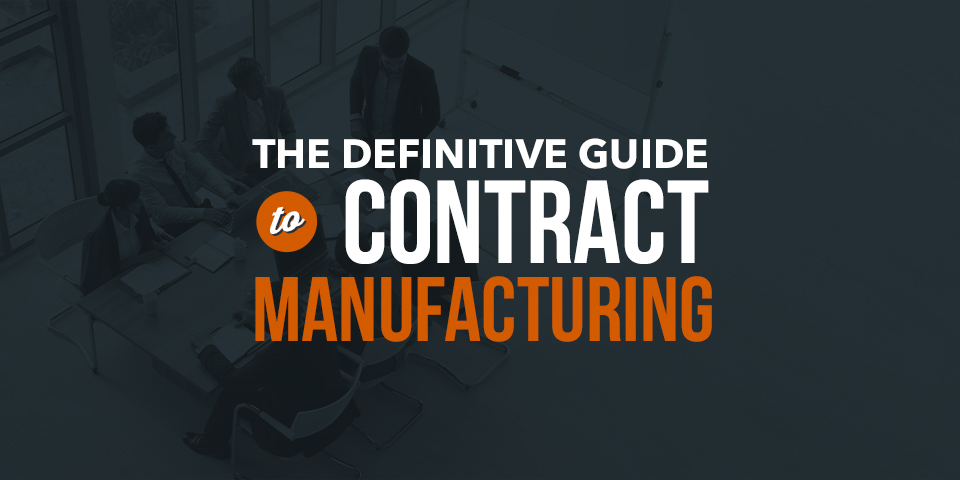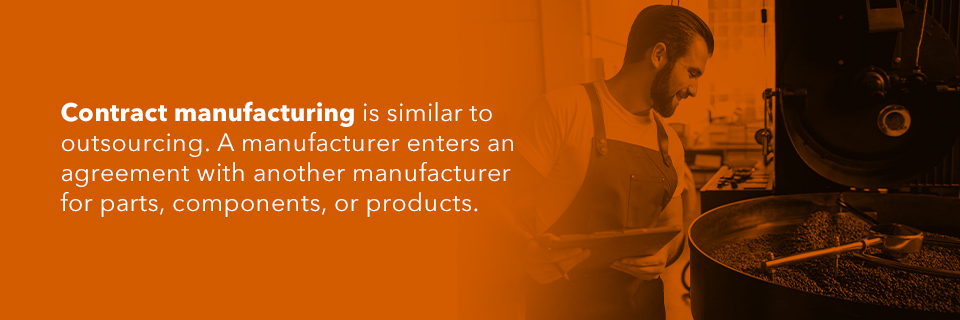 Contract manufacturing is a vital, though little understood, part of modern business dealings. It involves manufacturers working in tandem with one another to create a finished product. Below, we’ll discuss everything you need to know about contract manufacturing — its definition, its pros and cons, and when and how you should use it.
Table of Contents:
Contract manufacturing is a vital, though little understood, part of modern business dealings. It involves manufacturers working in tandem with one another to create a finished product. Below, we’ll discuss everything you need to know about contract manufacturing — its definition, its pros and cons, and when and how you should use it.
Table of Contents:
- What Is Contract Manufacturing?
- What Are the Forms of Contract Manufacturing?
- Pros of Contract Manufacturing
- Cons of Contract Manufacturing
- When Should You Use Contract Manufacturing?
- How to Choose the Right Contract Manufacturing Partner
- Contract Manufacturing FAQs
- Why Partner with Joe’s Garage Coffee?
- Contact Joe’s Garage Coffee

What Is Contract Manufacturing?
Contract manufacturing is similar to outsourcing. A manufacturer enters an agreement with another manufacturer for parts, components, or products. These parts are then used for further manufacturing or to complete a product. In most cases, the term “contract manufacturer” refers to the company that makes products for another. Contract manufacturers can also serve as bridges between two businesses. A company has to make decisions about every component it uses to create products. It has to consider what products it’ll make itself and what it should buy. In many cases, purchasing certain parts is more cost-effective and easier than creating them from scratch, and a company would then seek a contract manufacturer.Explore Our Contract Manufacturing Services
What Are the Forms of Contract Manufacturing?
Contract manufacturing can take on many forms. Here are four of the most common:- Producing finished goods by one company for another: In this case, the contract manufacturer will create complete products for another company. The company that buys the products sells them under its own label.
- Producing parts or components by one company: Used often by technical industries, this form involves a contract manufacturer creating parts for further manufacturing. For example, a contract manufacturer might create small computer components for later manufacturing by a computer company.
- Hiring service or labor force: Companies also often outsource for labor. Subcontracting labor is a common practice, often because contract manufacturers may be experts in specialized fields.
- Using manufacturing equipment or a facility: Manufacturing equipment is expensive and often large, taking up a great deal of space. Companies that do not have their own manufacturing facilities use contract manufacturers.

Pros of Contract Manufacturing
Companies choose contract manufacturing for many reasons. Opting for specialized manufacturers to create your products or product components can result in many notable benefits, including:- Reduction of costs: A significant advantage of contract manufacturing is lower costs. Companies can save on buying complex, expensive equipment and maintaining that equipment. They’re also not directly responsible for the labor costs associated with the manufacturing.
- Increased manufacturing capacity: Contract manufacturing allows companies to take advantage of existing mass-production methods, which reduce costs and let companies increase their production.
- Diversified product offerings: Companies can create a wider array of products if they can outsource those products’ production, and they can offer more options to consumers as a result.
- Greater focus on core areas: One of contract manufacturing’s main benefits is that it allows for better specialization. Companies that use contract manufacturing can focus on their core competencies, such as social media marketing, rather than investing in areas like manufacturing.
- Streamlined supply chain: Another reason a company might use contract manufacturing is to simplify its supply chain. The company can receive products or components from one manufacturer instead of several sources. The contract manufacturer is responsible for managing multiple suppliers and intermediaries.
- Reduction of manufacturing time: Those who specialize in manufacturing have developed ways to create products faster. Use a contract manufacturer to shorten production time.
- Improved product quality: A trusted contract manufacturer has plenty of experience in the necessary areas. That manufacturer can then offer quality components, products, or services to enhance your product quality.
- Ability to scale: Companies who use third-parties when necessary have resources freed up for other purposes. They can dedicate these resources to scaling upwards, and they can also scale the services they receive from contract manufacturers.
- Reduced liability: Companies who use contract manufacturing also have reduced liability should there be any issues with the final product. The contract manufacturer is responsible for ensuring the safety of the products or components it creates.
Cons of Contract Manufacturing
Though contract manufacturing has many benefits, it also has potential cons. Be aware of the following when selecting contract manufacturing:- Limited control: The company that hires a contract manufacturer decides on the product design and specifications. It has little to no control over the process and production methods, limiting its quality control abilities.
- Risk of choosing the wrong contract manufacturing partner: Choosing the wrong contract manufacturer can impact the quality of your product and your reputation as a company.
- Competition for the contract manufacturer’s priority: Most contractors maintain more than one client at a time. Competition can then cause friction as the contractor might have to decide which companies to prioritize.
- Intellectual property risks: Companies might consider the risks of allowing a third party access to their patented product design. Work with a trustworthy company to prevent risks to your intellectual property.

When Should You Use Contract Manufacturing?
Whether you should use contract manufacturing is a monumental decision for any company. Here are some scenarios in which using contract manufacturing would be a good idea:- Your business is just starting: In the early stages, startup costs tend to be high and resources may be limited. Young companies should almost always utilize contract manufacturing until cash flow is more reliable and resources more accessible.
- You need to increase capacity right away: When you have an unexpected spike in demand, you’ll need a contract manufacturing partner with the capacity to fill greater orders for you or increase production.
- You need to diversify into new product formats: If your product needs an upgrade, experimenting with your formula or manufacturing processes can be a huge investment. Outsourcing product format diversity will save time and money.
- You want to improve product quality: Contract manufacturers are experts with access to the newest technology. Rather than trying to improve your product by tinkering with it on your own, entering a contract with a facility is a better choice.
- Your business needs the ability to scale: If your company has been stuck in one stage of growth, freeing up some resources might allow you to scale upwards. Utilizing a contract manufacturer will give you more capital to use for other purposes.

How to Choose the Right Contract Manufacturing Partner
If you’ve decided your business would benefit from a contract manufacturer, your next step is to find the best possible partner. A lot of weight hangs on you making the right choice. The best contract manufacturing partner will provide high-quality products promptly, elevating your brand image and helping you become stronger. Before you enter a contract, keep in mind all of the following considerations.Explore Our Contract Manufacturing Services
Be Prepared to Find a Partner, Not Just a Supplier
When searching for a contract manufacturer, you’re looking for a company you can form a long-lasting, mutually beneficial relationship with. Look for a company that will field your concerns and work with you to create the best possible products. Remember, you’re looking for a partner, not just a supplier.Assess Their Scalability and Available Capacity
If you’re looking to scale upwards in the future, you’ll need a partner that can scale with you. If your contract manufacturer has only one small facility, it might not have the capacity or resources to provide you with more products when needed. If your company can sell more products but your contract manufacturer cannot supply you with those products, you’ll be in a difficult position. Look for a partner with plenty of scalability and room to accommodate your potential growth.Research the Company’s Reputation and Experience
Make sure the contractor has a positive reputation and extensive experience. Look for case studies detailing past partnerships. Fact-check the data the firm claims. It’s also a good idea to seek out reviews from the companies it has worked with. You might even contact some of the contract manufacturer’s past or current partners and ask them how they would rate the partnership. Keep in mind most contract manufacturers will not share with you who their clients are, and you can expect them to maintain the same confidentiality for your brand.Learn More about Qualified Personnel
Any contract manufacturer should have experts on staff. Research the company’s employees, including the qualifications of its certified experts. Make sure you’re putting your product creation in qualified hands.Check for State-Of-The-Art Equipment, Technology, and Processes
Key benefits of using a contract manufacturer include its access to the latest technology and knowledge of the best available processes. Do some research and ask questions about the technology the company uses. Remember, you’re paying for expertise and high-quality resources. Ensure the contractor has access to exclusive equipment, technology, and processes.Make Sure They Know How to Communicate
You and your contract manufacturer should have a positive relationship. At some point, you may need to make changes to your products, increase production, or otherwise alter your original agreement. When that happens, you’ll need to rely on your lines of communication with your partners. If they struggle with miscommunication, you could experience issues down the line. Before entering a contract, make sure the company will communicate effectively with you. If during negotiations, representatives take a long time to contact you back or often misunderstand you, consider finding a different partner. Look for a partner known for fast response times and flexibility.Explore Our Contract Manufacturing Services
Contract Manufacturing FAQs
You might still find yourself with unanswered questions about contract manufacturing. Here are some answers to the most frequently asked questions surrounding this topic.What Is the Difference between Contract Manufacturing and Private Labeling?
Contract manufacturing differs from private labeling. In a private labeling situation, a company chooses an already existing product from a manufacturer and applies its label for sale. These products are sometimes called “store brand” products. Contract manufacturing, in contrast, involves a company seeking a manufacturer for its own unique product attributes.What Is the Difference between Contract Manufacturing and Outsourcing?
The terms contract manufacturing and outsourcing are often interchanged with each other. Contract manufacturing is a form of outsourcing — outsourcing is a more general term. It refers to obtaining any goods or services from third-parties, while contract manufacturing refers to hiring a partner to manufacture your products.What Is the Difference between Contract Manufacturing and Licensing?
Contract manufacturing is limited to outsourcing stages of production, while licensing is much more involved. Licensing is a contractual arrangement in which a company sells the right to use its intellectual property to a firm in return for fees. The patent owner is the licenser, and the third party is the licensee. A licensee has greater control over the product than a contract manufacturer would since contract manufacturers do not purchase the rights to your intellectual property.How Much Does Contract Manufacturing Cost?
The costs associated with contract manufacturing vary depending on the product and industry in question. Costs will depend on the materials needed, the complexity of the manufacturing required, and the size of the company’s orders. Most companies see a reduction in overall production costs when they choose to use contract manufacturers.
Why You Should Outsource Coffee Manufacturing
From large companies manufacturing their own private label coffee to retailers and online coffee startups, there reaches a point when hiring a contract coffee manufacturer makes sense from a business point of view. The benefits of outsourcing for growing businesses is apparent, but what does an institutional buyer or larger corporation have to gain from outsourcing their coffee manufacturing needs? Outsourcing can be a difficult decision, as most feel very protective of their private label coffee brand. However, Joe’s Garage Coffee ensures that when you outsource all your roasting and packaging needs to us, you’re completely satisfied with the results. Here are five reasons you should outsource coffee manufacturing.1. TO SAVE MONEY
The number one reason to outsource your coffee manufacturing needs is that it saves you money. A lot of costs are associated with coffee production. When you hire Joe’s Garage Coffee as your co-packer, our built-in coffee manufacturing infrastructure ensures you don’t have to bear the weight of start-up costs. We already have everything in place to produce a superior coffee product, including:- Production space
- High-quality equipment
- Raw materials like packaging material and green coffee beans, if you don’t wish to supply your own
- Advanced Inventory Management System
- Trained staff
- Quality certifications
2. FOCUS ON THE BIGGER PICTURE
When you outsource everything related to the manufacturing of your private label coffee products, we manage the production end so you can focus on the bigger picture. If you’re an institutional buyer, your company has other logistical concerns to worry about. Since time is money, you’re better off focusing on the complexities of administrating your business. In other words, outsource the headaches. Once you’ve created coffee products you’re proud to attach your name to, leave the daily grind of production concerns to us.3. GET OUTSIDE EXPERIENCE
When it comes to the coffee industry, our team at Joe’s Garage Coffee has seen it all. Over 20 years of experience has given us insider knowledge into what things cost, how much time it takes, and how to ensure a great tasting cup of joe. When you outsource your coffee manufacturing needs to us, you can be sure our expertise will be used to create high-quality coffee products with efficiency and care. Outsourcing allows you to take advantage of our industry expertise, as well as our creativity and innovation. Not only do we equip our facility with state-of-the-art roasting and packaging technology, but we’ve also hired industry experts whose only job is to ensure your brand stands for quality, including:- Licensed Q-Grader
- Expert Master Roaster
- Food Scientist
- Quality Control Manager
4. EASILY ENTER THE MARKET
When you outsource to a contract manufacturer like Joe’s Garage Coffee, we assist those looking to develop their own private label brand. This allows both new and larger businesses to innovate and create incredible tasting private label coffee blends without worrying about out of control costs. Our low minimums ensure you can start small, yet have room to grow when the time comes.5. ENJOY FLEXIBILITY AND SCALE
Although coffee is a rapidly growing industry, demand still fluctuates. When you outsource your coffee manufacturing needs to Joe’s Garage Coffee, we can increase or reduce output as needed. Our scalable capacity means we can handle both low and high volume orders as your brand grows.Why Partner with Joe’s Garage Coffee?
If you’re looking to partner with a coffee product manufacturing company, consider Joe’s Garage Coffee. We provide custom coffee roasting and packaging services, manufacturing hundreds of millions of products for clients around the world. Should you choose to partner with us, you’ll be able to achieve all of the following goals:Increase Your Capacity Fast
If you want to grow as a company, it’s important to choose contract manufacturers who can support you along the way. At Joe’s Garage Coffee, we have the flexibility and resources needed to meet your order requests. We have a 50,000-square-foot facility fitted with high-tech equipment. We can help you focus on growth, accommodating increasing order sizes. Fluctuating capacity demands are no issue for us.Increase Your Product Quality
Maintaining and enhancing product quality are major considerations for companies seeking contract manufacturers. At Joe’s Garage Coffee, we’re the experts when it comes to manufacturing coffee & tea products. On our team are industry experts with time-tested expertise, and we can help you enhance your brand’s product quality.Outpace the Competition with New Product Formats
The coffee industry is a competitive space, but finding the right partners can help you elevate your brand above the competition. Your contract manufacturer should help you develop new product formats. We’re at the forefront of new coffee product format development. With our innovation, we can help you stand out from the competition and create unique coffee products through diversification.Ensure Your Success with a Committed Partnership
We understand the importance of smooth communication. We keep you in the loop throughout the entire manufacturing process. Our customer service representatives maintain communication with you to ensure accurate and precise results. We inform you about every step in our process, answering all of your questions. It’s no surprise that Joe’s Garage Coffee has an award-winning customer service team to support your growing brand.Scale up and down with Ease
We’re happy to accommodate your fluctuating needs. Should you need to increase or decrease your product order sizes, we can work with you. We become partners in business growth and adapt to your needs during seasons of decline and boom.Contact Joe’s Garage Coffee
Utilizing contract manufacturing is a wise business practice for many companies. Choose the right contract manufacturing partner to reap its many benefits. It allows for reduced costs, more streamlined processes, better scalability, product diversification, and other advantages. If you’re looking for a contract manufacturer for coffee-related products, consider Joe’s Garage Coffee. We aim to become the most customer obsessed manufacturing company in the world. We’re ready and eager to become your partners and begin serving your manufacturing needs. To learn more, contact us today.








